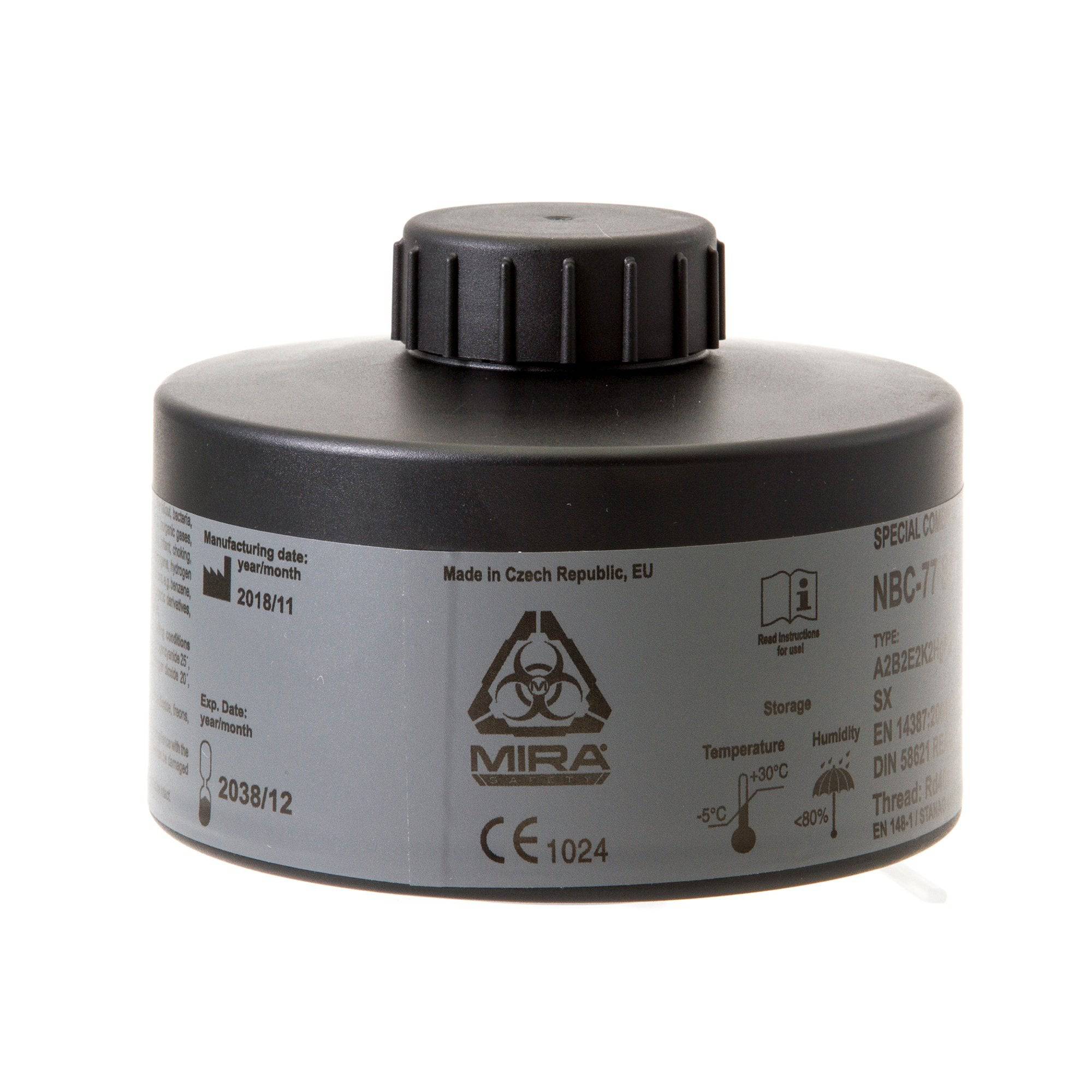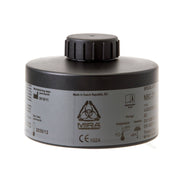Mira Safety Gas Mask Filter NBC-77 SOF 40mm Thread - 20 Year Shelf Life
CBRN Gas Mask Filter NBC-77 SOF 40mm Thread
Estimated Lead Time: Two Weeks
The NBC-77 SOF filter canister, in combination with a full-face mask, mouthpiece assembly, or PAPR, reliably protects air passages against a wide range of harmful and highly toxic substances including all known CBRN agents.
The filters are produced with standard round threads according to STANAG 4155 (EN 148- 1)- Rd 40x1/7". The filter components are made of hard plastic. This results in a very robust product that is extremely durable against shock and impact damage in operational use.
KEY FEATURES:
- Compatible with standard 40mm NATO threaded respirators, which are widely available.
- 20-year shelf life - save money long-term by not having to replace your filters every 5 years
- Used by military personnel, CBRN specialists, and special operations forces all over the world
- Filter all known CBRN agents, including radioactive iodine, rated for A2B2E2K2HgSXP3 D R.
- Certified by European agencies and has the “CE” symbol. Compliant under EN 14387:2004 + A1:2008


Note:
1) Standard EN 14387+A1
2) The filter was tested on dolomite dust clogging
3) Radioactive iodine and its organic compound - methyliodide¹³¹ acc. to standard DIN 58621
APPLICATION:
The filter canister in connection with a suitable respirator or PAPR provides protection against solid and liquid particles, pepper spray (OC), smoke-producing substances, radioactive particles, bacteria and rickettsia, fungi, toxins, viruses, riot control agents (lachrymators, sternutators, vomiting agents), blister agents (vesicants), choking agents, blood agents, nerve agents, incapacitants, herbicides, pesticides, and TIC, such as bromoacetone, CS, CR, CN, CNC, CNS, CA substances, organic compounds of arsenic - diphenyldichlorarsine - CLARK I (DA), diphenylcyanoarsine - CLARK II (DC), adamsite (DM), diphenyldichlorarsine (DA), ethyldichlorarsine (ED), methyldichlorarsine (MD), mustard gas (H), sulphur mustard gas (HD), T-mustard gas, Q-mustard gas, nitrogen mustard gases (HN1, HN2, HN3), lewisite (L), mixed mustard gas (H-L), phosgene oxime (CX), phosgene (CG), diphosgene(DP), chloropicrin (PS), hydrogen cyanide (AC), cyanogen chloride (CK), arsine (SA), G-agents: sarin (GB), cyclosarin (GF), soman (GD), tabun (GA), IVA (GV), V-agents: VX, VR, VE, VG (amiton), VM and toxic industrial chemicals such as: fumes of organic or inorganic acids, hydroxides, organic solvents with a boiling point above 65° C, ammonia, amines, inorganic and acid gases, agricultural chemical combustion gases, other toxic substances, e.g. benzene, toluene, vinyl chloride, fluorine, hydrogen fluoride, sulphur oxides, chloroacetic acid, aldehydes, mixtures of inorganic acids, and organic substances, mercury vapors, radioactive iodine, organic compounds of iodine (Iodomethane, 129, 131), radioactive particles, etc.

LIFETIME:
Breakthrough time of a filter is tested according to EN 14387+A1 at humidity 70% and flow rate 30 l/min, which is equivalent to the volume of air per minute used by an average person carrying out medium heavy work. The approximate lifetime (usage time) of a filter may, under normal conditions, calculated by comparing the concentration at the workplace and the minimum Dynamic Adsorption Capacity (DAC) for the filter.
STORAGE AND MAINTENANCE:
The filters are sealed in plastic bags by the manufacturer. Store the filters unopened in a clean place at even temperature, most appropriate at -5 to +30°C and relative humidity below 80%. Sealed filters tolerate also conditions of -30 to +50°C and RH below 95%. The storage period (month and year) for filters is marked on the filter label. Do not try to regenerate the filters. Never clean the filters with compressed air or compressed water.
DISPOSAL:
After use, the filters are special refuse. Make sure that they are disposed of according to the filtered substance (gases or particles) in accordance with current waste treatment regulations. If the product is to be disposed of, it should be dismantled from the respirator and disposed of as solid waste. Please see local authority regulations for disposal advice and locations.



